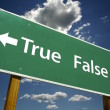The Transcendental Certitude of Metaphysical First Principles
by Dr. Dennis Bonnette
Filed under Belief, Philosophy

How do we really know that basic metaphysical principles, such as, that contradictions in being are impossible, are both certain and transcendentally true? That is, how do we have perfect certitude that they apply validly to every possible thing, including the God of classical theism? Some have argued that the principle of non-contradiction (PNC), which states that the same thing cannot both be and not be in the same respect, applies merely to macroscopic reality – to the humans... Read More
Do Theological Claims Need to be Falsifiable?
by Dr. Edward Feser
Filed under Belief, Christianity and Science

Antony Flew’s famous 1950 article “Theology and Falsification” posed what came to be known as the “falsificationist challenge” to theology. A claim is falsifiable when it is empirically testable—that is to say, when it makes predictions about what will be observed under such-and-such circumstances such that, if the predictions don’t pan out, the claim is thereby shown to be false. The idea that a genuinely scientific claim must be falsifiable had already been given currency... Read More
Is It Reasonable to Believe in Miracles?
by Karlo Broussard
Filed under Belief

Should I believe in miracles? This question doesn’t pertain to whether I should believe in this miracle or that miracle. It has to do with whether I’m rationally justified in believing in miracles as such. David Hume's Wisdom for the Wise The eightenth-century Scottish skeptic philosopher David Hume argued the wise man should not believe in miracles. The basis for his assertion was what might be called the “repeatability principle”—evidence for what occurs over and over (the... Read More
The Myth of the Free-Thought Parent
by Dr. Randal Rauser
Filed under Belief

Some years ago while I was delivering a lecture on faith and reason at a secular university, I informed my audience that I had taught the Apostles’ Creed to my daughter, who was four or five at the time. I then noted that as a family we recited the creed every day during our family devotions. As I expected, the audience appeared to be disturbed by my revelation. One of the students spoke for many when she insisted that children should be raised without “religious dogma”. Instead,... Read More
3 Easy Steps to Show that Absolute Truth Exists
by Joe Heschmeyer
Filed under Belief

Gorgias the Nihilist, an ancient Greek philosopher, was said to have argued the following four points: Nothing exists; Even if something exists, nothing can be known about it; and Even if something can be known about it, knowledge about it can’t be communicated to others. Even if it can be communicated, it cannot be understood. Of course, if you can understand his argument, he’s wrong. So too, many modern thinkers hold to positions that, fall apart into self-refutation when critically... Read More
How to Prove that Transcendentalism is True
by Dr. Peter Kreeft
Filed under Belief

Editor's Note: This is a follow-up piece to Dr. Peter Kreeft's article from earlier in the week titled "Why Reality Includes More (Not Less) Than You Probably Think". Be sure to read that one first. Merely refuting reductionism does not yet give us any positive evidence for transcendentalism, however, just as merely refuting atheism does not give you positive evidence for theism. We might well be stuck in agnosticism, unable to prove either of the two contradictory propositions,... Read More
Why Reality Includes More (Not Less) Than You May Think
by Dr. Peter Kreeft
Filed under Belief

The most usual position among philosophers in the Western world today, in fact the most usual position among academics generally, is some kind of reductionism. By “reductionism” I mean simply the belief that the world-view, or implicit metaphysics, of most people, or ordinary people, especially people of previous eras and cultures, errs by believing too much; that Hamlet’s Shakespeare was exactly wrong when he said to Horatio that “there are more things in heaven and earth than... Read More
Irreconcilable Differences: The Divorce of Materialism and Truth
by Philip Lewandowski
Filed under Anthropology, Belief, Evolution

According to many today, the advance of the natural physical sciences continues to shrink the “space” for God. The “gaps” where someone can place God are decreasing, and therefore the “God hypothesis” will one day be swallowed whole by the progress of the scientific endeavor. Even more, the “space” where one could posit the human person as something more than just a complex, organized collection of matter and energy is said to have disappeared. While I find a materialist... Read More
Exorcising Epistemology
by Matthew Becklo
Filed under Belief

Two fantastic articles at Strange Notions in recent weeks have turned from the question of God to the question of the human self. In “Atheism and the Personal Pronoun,” Patrick Schultz explores what he calls a “doorstop” argument for the soul: under materialist atheism, we are mindless machines, but given that every one of us is inescapably a subjective “I,” materialist atheism looks false. In “Exorcizing the Ghost from the Machine,” Matthew Newland counters this argument... Read More
Do Catholics Know Their Theology is Correct?: A Response
by Brandon Vogt
Filed under Belief

NOTE: On Monday we featured a guest post by one of our non-Catholic contributors, Steven Dillon, titled "Do Catholics Know Their Theology is Correct?". Today Catholic writer Brandon Vogt responds. Before beginning my response to Steven Dillon's thoughtful article at Strange Notions, "Do Catholics Know That Their Theology is Correct?", I want to first thank him for contributing. I've long admired Steven's clarity, good-will, and irenic approach. It's always a delight to interact... Read More






